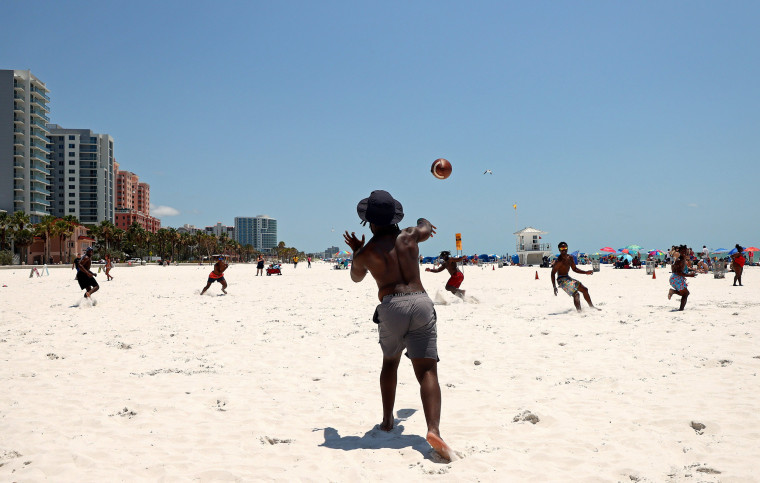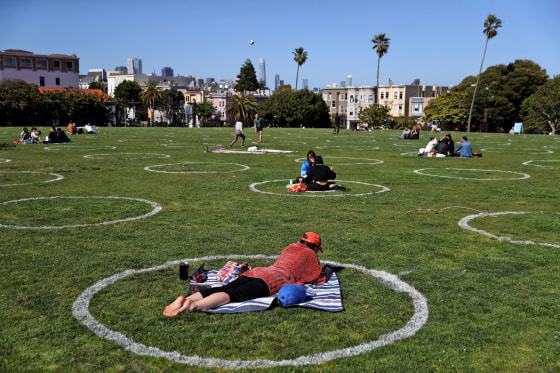With Memorial Day approaching, beaches are reopening. Cities are letting restaurants seat people outside and closing streets to encourage foot traffic. Many parks are also letting people back in.
Stay-at-home orders have been eased in many cities this week just as temperatures are warming up for the holiday weekend. And many of the changes have a distinct feature: They allow for outdoor activities.
A growing scientific consensus around the spread of the coronavirus has given the OK for people to be outdoors but with some very important caveats. The developments are balanced by concern that people will view the changes as a license to ignore other recommendations, such as social distancing and wearing masks.
Full coverage of the coronavirus outbreak
"Based on the data that is emerging, the risk of transmission outside — especially while practicing social distancing — is almost negligible," said Dr. Isaac Bogoch, an infectious diseases physician and associate professor of medicine at the University of Toronto. "It seems to be a low-risk setting, but that doesn't mean there is no risk."
Some cities are taking note and preparing for more people to spend time outside.
Seattle officials announced that 20 miles of streets will be closed to traffic, giving people more space to exercise, bike or stroll. Illinois Gov. J.B. Pritzker announced Wednesday that bars and restaurants could reopen with outdoor seating in the third phase of his reopening strategy. Ohio did the same last week, allowing restaurants and bars to open for diners outside. And some New York City streets are being converted into bicycle and pedestrian roads to give people more space to remain physically distant.
But the reopenings aren't meant to let people drop their guard while the pandemic remains a serious risk. And while spending time outdoors may be safe, experts said, gatherings in enclosed spaces still pose particular dangers.
"In settings where people are clustered together in an enclosed space — that's a really good setup for spreading this infection," Bogoch said.
Experts generally agree that it's safe to spend time outdoors, provided that people follow social distancing guidelines and practice good hygiene. Although some early research has suggested that the virus could remain on certain surfaces for days or linger in tiny droplets in the air, scientists say there is no evidence yet that the bulk of transmissions has occurred this way.
Still, there are ways people can keep themselves and their families safe while venturing outside, Bogoch said. Chief among his guidelines is to always practice proper social distancing, which means staying at least 6 feet apart from others. Frequent hand-washing is also essential, he said. And he recommended wearing a mask or some other type of face covering when social distancing is challenging or impossible.

But for most people walking around or running outdoors, there's no need to be too anxious.
"If you're on a jog in a park without too many other people around or if you're walking down the street and can maintain some distance — even if someone just passes you on the street — the risk of getting something in that setting is very low," Bogoch said.
Scientists think most coronavirus cases resulted from close contact with infected people, particularly in enclosed spaces, such as restaurants or bars.
Three studies published recently by the Centers for Disease Control and Prevention examined coronavirus transmissions in three settings: a restaurant in Guangzhou, China, a call center in Seoul, South Korea, and a choir practice in Washington state. In each of the reports, scientists found that interactions in these confined spaces — including talking and singing — were likely to have contributed to outbreaks among people who had been present.
Although most states are limiting occupancy to control the flow of customers and diners, scientists said there are potential concerns beyond the crowds, such as whether an indoor space is well ventilated.
"You don't want the air to be stuffy," said Linsey Marr, a professor of civil and environmental engineering at Virginia Tech whose research specializes in viral transmissions. "With good ventilation, you can bring in fresh air and remove the virus from indoor air to prevent it from spreading. But in general, being outdoors is almost always better than being indoors."
The CDC studies also said ventilation in the indoor spaces was likely to have played a role in transmitting the pathogen.
"If you're indoors and you can't practice physical distancing, then you are certainly at a greater risk," Bogoch said.
Download the NBC News app for full coverage and alerts about the coronavirus outbreak
While limiting contact with those in the household is likely to be the safest approach, he said, it's safe to meet up with friends or family if social distancing is practiced. The measures will be especially important this Memorial Day weekend if people seek to spend the holiday at public beaches or parks.
Navigating gradual reopenings will require a degree of social trust that people will take their responsibilities seriously, said Joseph Allen, an assistant professor of exposure assessment science at the Harvard T.H. Chan School of Public Health.
"We should view going to parks and other activities that are starting to be reopened as a privilege and one that can be revoked quickly if we demonstrate we're unable to abide by these rules," Allen said Tuesday in a news briefing.
And Marr said that as more restrictions are eventually eased and lockdowns are lifted, it's important that people not become lax about social distancing and hand-washing.
"The safest thing to do is assume that anybody could be infected," she said.

